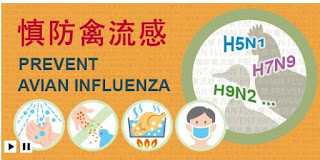 |
| Credit HK CHP |
#12,106
Yesterday it was only a suspected case, but this morning (evening, HK time), Hong Kong's CHP has confirmed the 10 year old boy who was recently hospitalized - then released - then rehospitalized and placed in isolation has tested positive for H7N9.
This is the 20th imported case to Hong Kong since the H7N9 virus emerged in 2013, and the 4th in the past month.
This report also makes note of a new reported case in Shanghai.
The Centre for Health Protection (CHP) of the Department of Health today (January 11) reported that the suspected imported human case of avian influenza A(H7) affecting a boy aged ten last night (January 10) had been laboratory confirmed. This is the fourth human H7N9 case in Hong Kong this winter.
His nasopharyngeal aspirate tested positive for influenza A(H7N9) virus upon laboratory testing of the CHP's Public Health Laboratory Services Branch.
Contact tracing has so far identified 27 close contacts and 70 other contacts.
Close contacts are the patient's family and school contacts as well as relevant in-patients and visitors of Princess Margaret Hospital (PMH). All have remained asymptomatic. They will be given antiviral prophylaxis with oseltamivir (Tamiflu) for five days, advised to wear a mask and put under medical surveillance for ten days following their last exposure to the patient.
Other contacts include the patient's school contacts, healthcare workers (HCWs) of North Lantau Hospital and PMH as well as ambulance personnel in patient transfer. Four HCWs of PMH have mild symptoms. Two of them were tested negative for influenza A and two are pending testing. The others have remained asymptomatic. They will be advised to wear a mask and will be put under medical surveillance for ten days following their last exposure to the patient.
From 2013 to date, 20 imported human H7N9 cases, including 13 males and seven females aged from five months to 85 years (median: 66.5 years), have been confirmed in Hong Kong, with seven deaths (35 per cent).
"In view of the upcoming Lunar New Year holidays, adults and parents should look after children with extra care in personal, hand, food and environmental hygiene against infections during travel," a spokesman for the CHP said.
"We strongly urge the public to avoid touching birds, poultry or their droppings and visiting poultry markets or farms during travel. If feeling unwell, such as having a fever or cough, wear a mask and seek medical advice at once. Travellers returning from affected areas should consult doctors promptly if symptoms develop, and actively inform the doctors of their travel history for prompt diagnosis and treatment," the spokesman said.
In addition, the CHP is closely monitoring an additional human H7N9 case in Shanghai. According to the Shanghai Municipal Commission of Health and Family Planning, the patient is a man aged 60 from Hubei.
"While local surveillance, prevention and control measures are in place, we will remain vigilant and work closely with the World Health Organization and relevant health authorities to monitor the latest developments," the spokesman said.
As the H7N9 virus continues to be detected in animals and environments in the Mainland, additional human cases are expected in affected and possibly neighbouring areas. In view of the heavy trade and travel between the Mainland and Hong Kong, further sporadic imported human cases in Hong Kong every now and then are expected, especially in the coming few months.Ends/Wednesday, January 11, 2017Issued at HKT 19:40